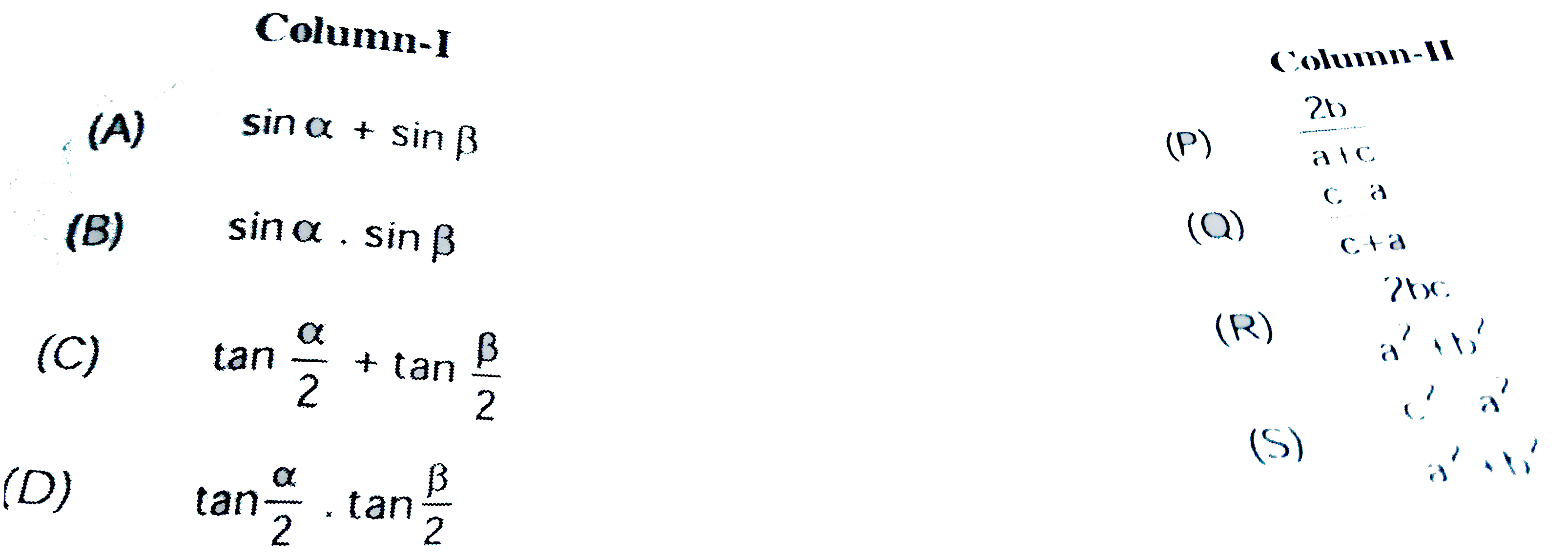Let α,β are the root of equation acosθ+bsinθ=c.
If α=30∘ and β=60∘ such that a,b,c represent sides of a ΔABC then
A
ABC is acute angle triangle
B
ABC is acute isosceles triangle
C
ABC is right angle triangle
D
ABC is obtuse angle triangle
Video Solution
Text Solution
The correct Answer is:A, B
α=30∘ and β=60∘⇒a2=b2=c√3+1
⇒cosC=2−√34>0
⇒∠(C) is acute angle and a=b represents ∠A=∠B
|
Topper's Solved these Questions
- TEST PAPERSBook:RESONANCEChapter:TEST PAPERSExercise:Math
Explore 105 Videos
- TEST PAPERSBook:RESONANCEChapter:TEST PAPERSExercise:MATHEMATICS
Explore 263 Videos
- TEST PAPERSBook:RESONANCEChapter:TEST PAPERSExercise:PART - I MATHEMATICS SEC - 2
Explore 1 Video
- TEST PAPERBook:RESONANCEChapter:TEST PAPERExercise:CHEMISTRY
Explore 37 Videos
- TEST SERIESBook:RESONANCEChapter:TEST SERIESExercise:MATHEMATICS
Explore 131 Videos
Similar Questions
Knowledge Check
Let α,β are the root of equation acosθ+bsinθ=c.
Which of the following is/are true.Asinα+sinβ=2bca2+b2Bsinα+sinβ=2bcb2+c2Ctan'α2+tan'β2=ba+cDtan'α2+tanβ2=2ba+cIf α and β are 2 distinct roots of equation acosθ+bsinθ=C then cos(α+β)=
A2aba2+b2B2aba2−b2Ca2+b2a2−b2Da2−b2a2+b2If α and β are the roots of the , quadratic equation ,ax2+bx+c=0 ,with α<β ,then for x<α (or) x>β, ax2+bx+c and a have ,
(A) Opposite sign
(B) Positive sign
(C) same sign
(D) none of theseArational numbersBreal and negativeCnegative real partsDnone of these
If α and β are the roots of the equation, acosθ+bsinθ=c, then match the entries of column I with the entries of column- II

View SolutionIf sinθ and cosθ are roots of equation ax2+bx+c=0, then
View SolutionIf α and β are the roots of the equation ax2+bx+c=0 where α 0 then (aα+b)(aβ+b) is equal to
View SolutionIf α and β are the roots of equation ax2+bx+c=0, then the value of αβ+βα is
View SolutionLet αandβ be the roots of x2+x+1=0, then the equation whose roots are α2020andβ2020 is
View Solution

